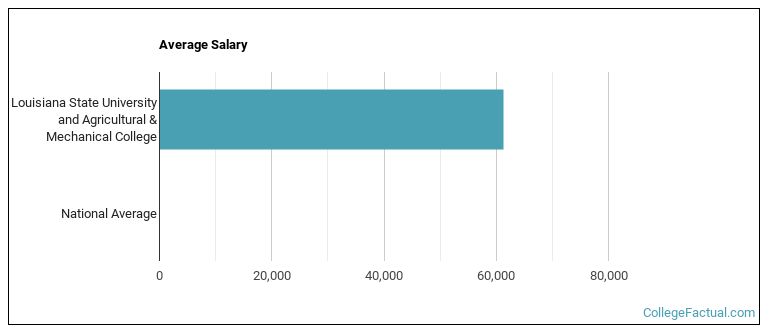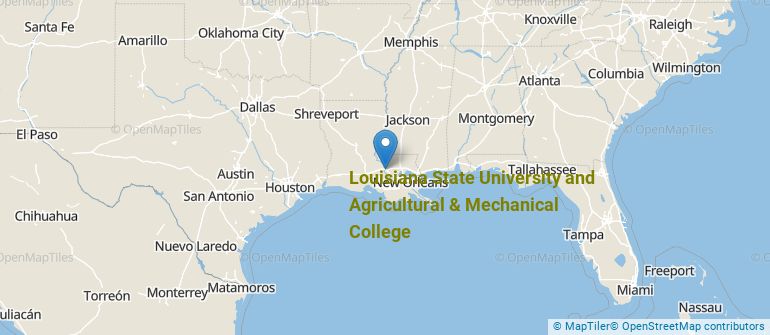 by our College Data Analytics Team
by our College Data Analytics Team
College Factual recognizes the best colleges and universities in its annual rankings. These rankings include categories for best overall colleges, best colleges for each major, best value schools, and much more.
Louisiana State University and Agricultural & Mechanical College was awarded 106 badges in the 2025 rankings. The highest ranked major at the school is teacher education grade specific.
Explore the best ranked schools for the programs you are most interested in.
Louisiana State University landed the #357 spot in College Factual's 2025 ranking of best overall colleges in the United States. The higher ed experts analyzed 2,152 colleges and universities across the nation to determine this ranking. This puts it in the top 20% of all schools in the nation.
Out of the 30 colleges in Louisiana, Louisiana State University is ranked at #2.
See all of the rankings for Louisiana State University and Agricultural & Mechanical College.
When it comes to admittance, Louisiana State University and Agricultural & Mechanical College is somewhat selective. Its acceptance rate is 76%, which means you'll face some strong competition during the admissions process. Do what you can to make your application stand out.
About 13% of students accepted to Louisiana State University submitted their SAT scores. When looking at the 25th through the 75th percentile, SAT Evidence-Based Reading and Writing scores ranged between 580 and 660. Math scores were between 560 and 660.
Learn more about Louisiana State University and Agricultural & Mechanical College admissions.
At Louisiana State University and Agricultural & Mechanical College, the student to faculty ratio is 22 to 1. Compared to the national average of 15 to 1, this is somewhat high. This could mean that class sizes may be larger than they are at other colleges or universities or that professors may be required to teach more classes.
In addition to the student to faculty ratio, some people look at what percentage of faculty members are full-time as a sign of how much time professors will be able to spend with their students. This is because part-time teachers may not be be on campus as much as their full-time counterparts.
The full-time faculty percentage at Louisiana State University and Agricultural & Mechanical College is 90%. This is higher than the national average of 47%.
Louisiana State University and Agricultural & Mechanical College has a freshmen retention rate of 84%. That's a good sign that full-time students like the school and their professors enough to want to stick around for another year. It's also a sign that the admissions team did a good job in choosing applicants who were a good fit for the school.
The on-time graduation rate for someone pursuing a bachelor's degree is typically four years. This rate at Louisiana State University for first-time, full-time students is 39%, which is better than the national average of 33.3%.
During the 2017-2018 academic year, there were 27,825 undergraduates at Louisiana State University with 24,097 being full-time and 3,728 being part-time.
| $0-30 K | $30K-48K | $48-75 | $75-110K | $110K + |
|---|---|---|---|---|
| $13,629 | $16,365 | $20,379 | $24,391 | $24,889 |
The net price is calculated by adding tuition, room, board and other costs and subtracting financial aid.Note that the net price is typically less than the published for a school. For more information on the sticker price of Louisiana State University, see our tuition and fees and room and board pages.
Almost 66% of college students who graduated with the class of 2018 took out student loans, but that percentage varies from school to school. At Louisiana State University, approximately 32% of students took out student loans averaging $8,404 a year. That adds up to $33,616 over four years for those students.
Get more details about paying for Louisiana State University and Agricultural & Mechanical College.


Contact details for Louisiana State University are given below.
| Contact Details | |
|---|---|
| Address: | 156 Thomas Boyd Hall, Baton Rouge, LA 70803-2750 |
| Phone: | 225-578-3202 |
| Website: | www.lsu.edu/ |
| Most Popular Majors | Bachelor’s Degrees | Average Salary of Graduates |
|---|---|---|
| Business Administration & Management | 509 | $41,232 |
| Social Work | 481 | NA |
| Teacher Education Subject Specific | 390 | $24,882 |
| Communication & Media Studies | 366 | $38,426 |
| Construction Management | 363 | $66,934 |
| General Biology | 348 | $22,742 |
| General Psychology | 232 | $23,859 |
| Human Resource Management | 201 | NA |
| Law | 200 | NA |
| Health & Physical Education | 192 | $31,956 |
Online learning options are becoming more and more popular at American colleges and universities. Online classes are great for students who have busy schedules or for those who just want to study on their own time.
In 2022-2023, 18,065 students took at least one online class at Louisiana State University and Agricultural & Mechanical College. This is an increase from the 18,052 students who took online classes the previous year.
| Year | Took at Least One Online Class | Took All Classes Online |
|---|---|---|
| 2022-2023 | 18,065 | 3,031 |
| 2021-2022 | 18,052 | 2,966 |
| 2020-2021 | 29,021 | 9,855 |
| 2018-2019 | 7,289 | 1,014 |
If you’re considering Louisiana State University and Agricultural & Mechanical College, here are some more schools you may be interested in knowing more about.
Curious on how these schools stack up against Louisiana State University? Pit them head to head with College Combat, our free interactive tool that lets you compare college on the features that matter most to you!
Footnotes
*The racial-ethnic minorities count is calculated by taking the total number of students and subtracting white students, international students, and students whose race/ethnicity was unknown. This number is then divided by the total number of students at the school to obtain the racial-ethnic minorities percentage.
References
More about our data sources and methodologies.